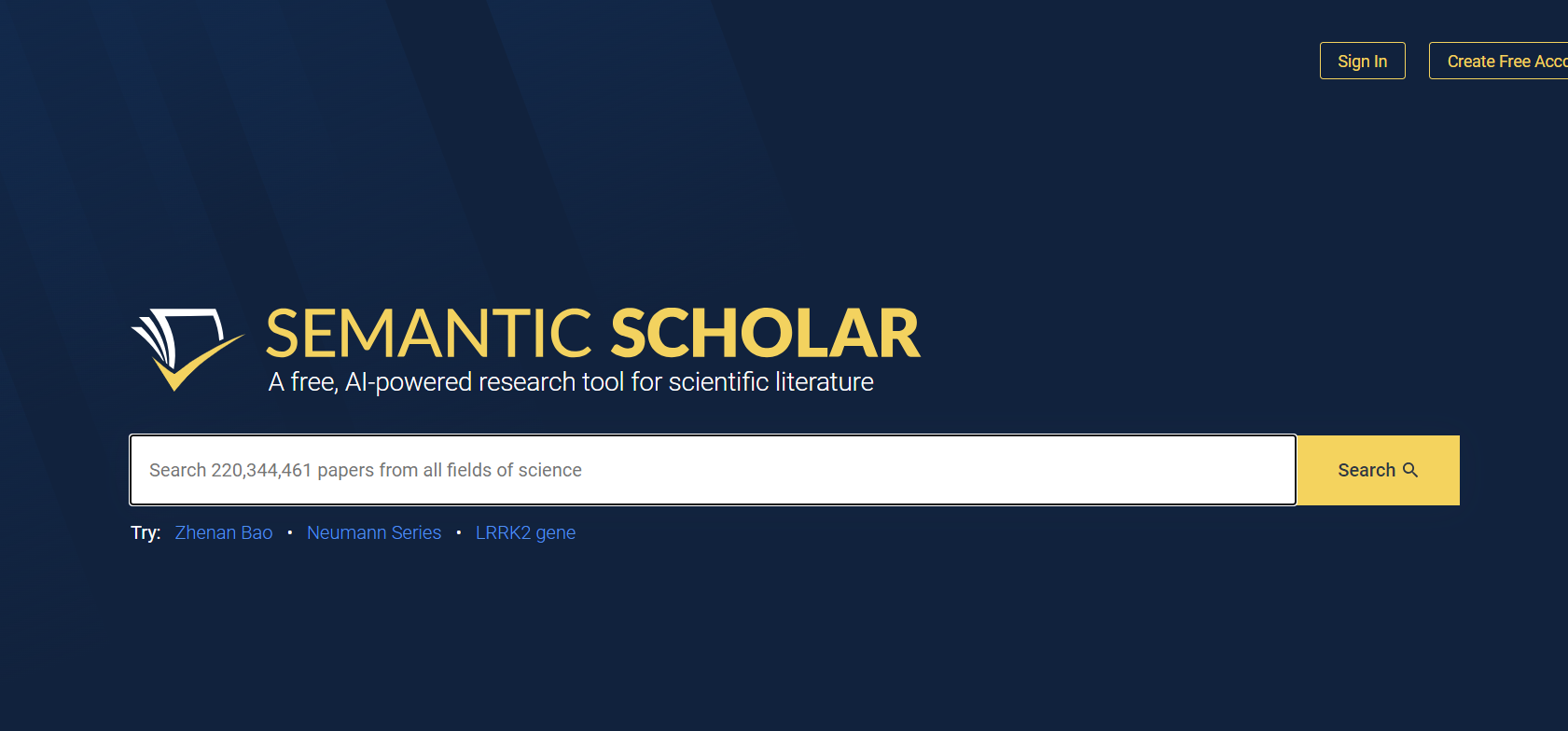In today’s rapidly evolving academic landscape, researchers face the challenge of navigating through vast amounts of data to find relevant information. To aid in this endeavor, several AI-powered tools have emerged, offering innovative ways to search, organize, and synthesize research. Below is a detailed exploration of some of the best AI tools for research, designed to streamline the academic process and enhance the quality of scholarly work.
1. Semantic Scholar
Overview:
Semantic Scholar is a free, AI-powered search engine tailored for academic research. Developed by the Allen Institute for AI, it focuses on delivering high-quality search results by filtering out less relevant content and highlighting influential research.

Key Features:
- Citation Tracking: Semantic Scholar provides tools to track how often a paper has been cited, helping researchers identify seminal works in their field.
- Influential Research: The platform highlights influential citations and key phrases, making it easier to discover groundbreaking studies.
- Organized Studies: Researchers can create a personal library to save and organize papers, enabling efficient management of academic resources.
- Research Insights: By leveraging AI, Semantic Scholar offers insights into research trends, helping scholars stay ahead in their fields.
Use Cases:
- Literature Reviews: Ideal for conducting thorough literature reviews by quickly identifying the most relevant and influential papers.
- Academic Networking: Researchers can discover collaborators by exploring who has cited their work or who is working in related areas.
Conclusion:
Semantic Scholar stands out as an essential tool for researchers aiming to discover and track high-impact academic papers, making it a cornerstone of modern research methodologies.
2. Research Rabbit
Overview:
Research Rabbit, often dubbed the “Spotify for Papers,” is a unique tool that helps researchers discover and organize academic literature through visual exploration. It allows users to build and explore visual graphs of related studies, offering a dynamic way to track academic literature.
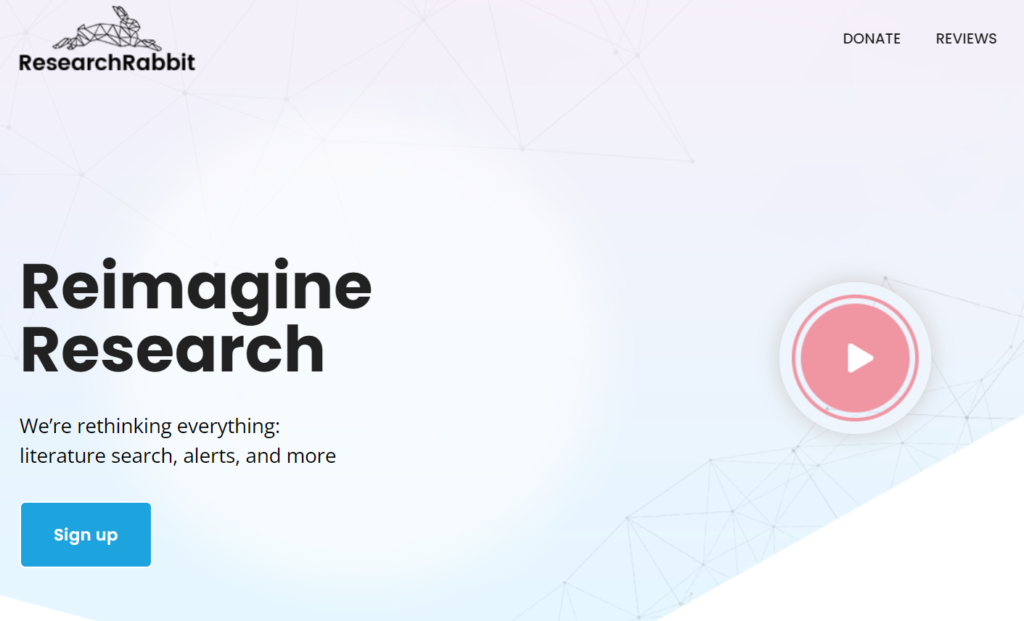
Key Features:
- Literature Discovery: Research Rabbit helps in discovering related academic papers based on existing research, making the literature search process more intuitive.
- Visualization: The tool creates visual graphs that illustrate connections between papers, helping researchers understand the relationships and developments in their field.
- Tracking and Alerts: Researchers can set up alerts to keep track of new publications and updates in their areas of interest, ensuring they stay up-to-date.
Use Cases:
- Research Exploration: Ideal for exploring new research angles by visualizing how different studies are interconnected.
- Academic Organization: Helps in organizing references and managing research materials visually, making it easier to track ongoing research.
Conclusion:
Research Rabbit is an innovative tool for researchers who prefer a visual approach to literature discovery, making it easier to explore and track academic papers in a connected, graph-based format.
3. SciSpace
Overview:
SciSpace is an AI tool designed to simplify the understanding of complex scientific concepts and to assist in literature reviews. It excels in summarizing large papers and providing explanations for difficult sections, making it a valuable tool for researchers who need to break down dense academic material.
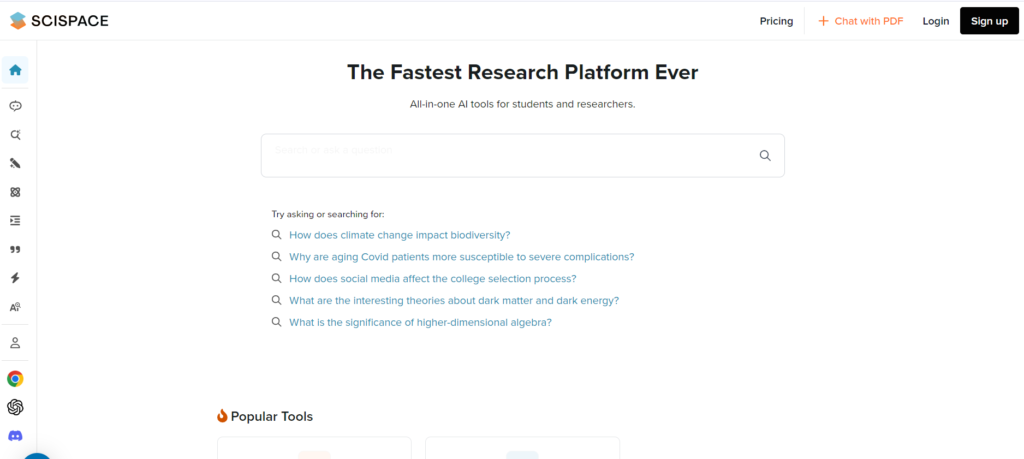
Key Features:
- Simplification: SciSpace can break down complex scientific concepts, making them more accessible to a broader audience.
- Literature Review Assistance: The tool assists in finding related articles and answering specific questions about a paper, streamlining the literature review process.
- Interactive Learning: SciSpace offers interactive features that allow users to ask questions and get AI-generated explanations, making it an excellent tool for learning and understanding new topics.
Use Cases:
- Understanding Complex Papers: Researchers can use SciSpace to get summaries and explanations of difficult sections, making complex papers easier to digest.
- Efficient Literature Reviews: The tool helps in quickly identifying and summarizing related research, saving valuable time during the literature review process.
Conclusion:
SciSpace is a must-have tool for researchers dealing with complex scientific papers, offering a way to simplify, summarize, and better understand challenging academic material.
4. Zotero
Overview:
Zotero is an AI-powered research assistant that helps manage references, search for articles, and create bibliographies. It is particularly useful for organizing research materials and synchronizing them across multiple devices.
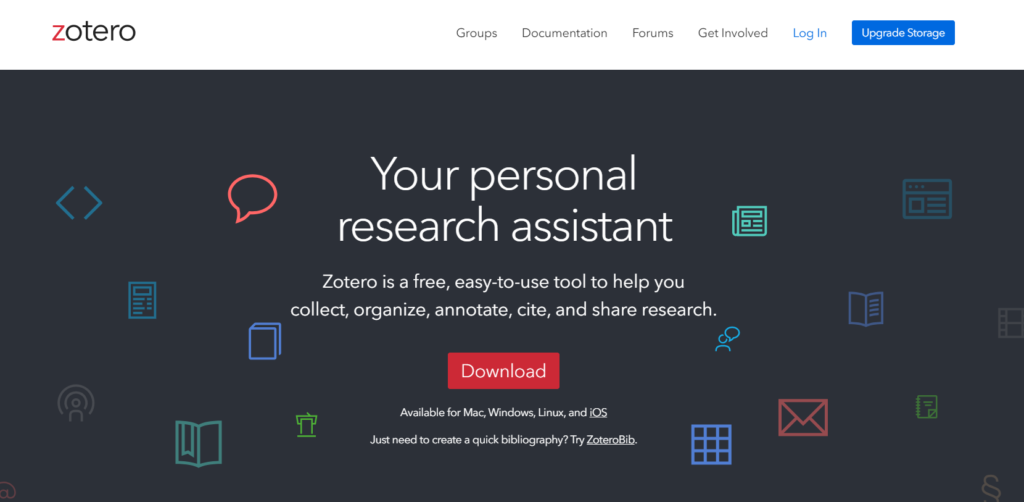
Key Features:
- Reference Management: Zotero allows researchers to save and organize references, creating a well-structured database of academic sources.
- Article Search: The tool integrates with various databases to facilitate the search for academic papers directly within the Zotero interface.
- Bibliography Creation: Zotero can automatically generate citations and bibliographies in a variety of formats, streamlining the writing process.
Use Cases:
- Research Organization: Zotero helps researchers keep their academic materials organized and easily accessible.
- Writing and Citing: The tool simplifies the process of inserting citations and generating bibliographies, making it a valuable asset during the writing phase of a research project.
Conclusion:
Zotero is an essential tool for any researcher who needs to manage a large number of references and streamline the citation process, making it a cornerstone of academic writing and research organization.
5. Consensus
Overview:
Consensus is an AI tool that specializes in summarizing research findings from multiple sources, offering a consolidated view of diverse perspectives on a given topic. It helps researchers generate insights by synthesizing information from different studies.
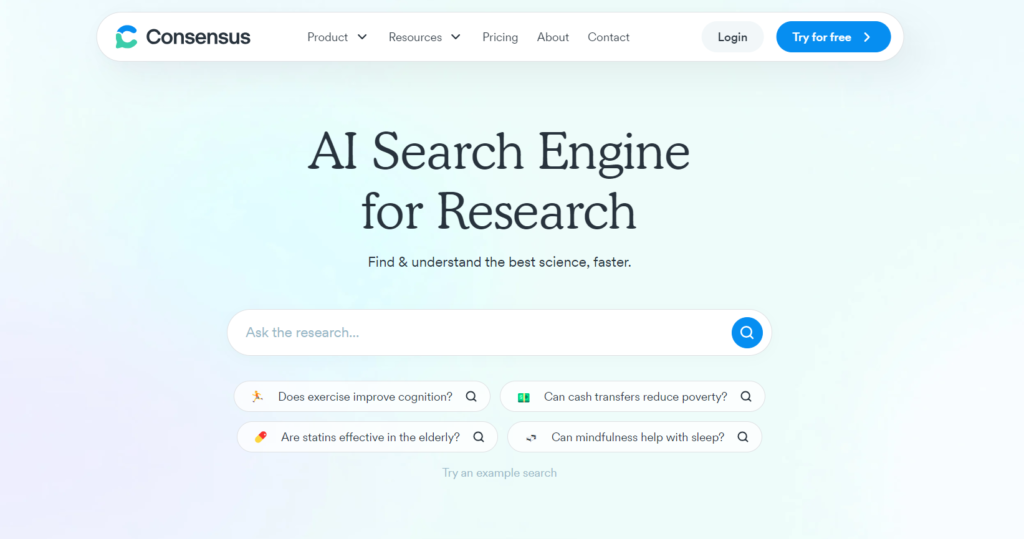
Key Features:
- Research Summarization: Consensus summarizes findings from various studies into concise, easy-to-understand summaries.
- Diverse Perspectives: The tool integrates multiple viewpoints, providing a comprehensive overview of research on a particular topic.
- Insight Generation: Consensus helps researchers identify trends and insights by synthesizing data from multiple sources, making it easier to draw conclusions.
Use Cases:
- Systematic Reviews: Ideal for conducting systematic reviews by summarizing and comparing research findings across multiple studies.
- Insight Development: Helps in developing insights by providing a synthesized overview of diverse research perspectives.
Conclusion:
Consensus is a powerful tool for researchers who need to consolidate findings from multiple studies, making it easier to draw comprehensive conclusions and generate valuable insights.
Final Thoughts
Each of these AI tools offers unique features that cater to different aspects of the research process. Whether you need to discover new literature, manage references, simplify complex papers, or summarize research findings, these tools can significantly enhance your academic workflow. Incorporating these AI-driven platforms into your research routine can help you stay ahead in your field and make the research process more efficient and effective.
